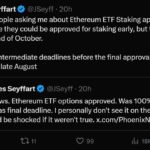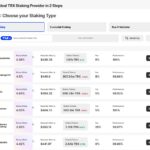The cryptocurrency scene is abuzz with exciting developments, particularly regarding investment vehicles in the digital assets realm. Canary Capital has recently made headlines by filing a proposal to launch an exchange-traded fund (ETF) that would track the price of Tron’s native token, TRX. This potential product, named the Canary Staked TRX ETF, aims to not only monitor TRX’s market performance but also to employ staking strategies, which could attract investor interest in a more rewarding way.
On Friday, the hedge fund submitted a Form S-1 to the Securities and Exchange Commission (SEC), marking a significant step towards introducing this unique investment option. If the SEC approves the initiative, the ETF would utilize staking through third-party providers, with BitGo appointed as the custodian for assets. The ETF’s performance would align with the spot price of TRX, determined by calculations from CoinDesk Indices.
Interestingly, this proposal comes at a time when the cryptocurrency regulatory landscape is shifting. Previously, issuers seeking to include staking in their ETFs faced hurdles, particularly under the leadership of former SEC Chair Gary Gensler, who was known for his strict stance against staking mechanisms. However, renewed optimism is evident following the appointment of crypto-friendly Chair Paul Atkins. This change has led to speculation that futures may hold more favorable conditions for staking features in proposed ETFs.
“The SEC’s recent hesitance on staking proposals, such as that of Grayscale for their Ethereum Trust ETFs, coupled with their postponements, highlight the tensions between cryptocurrency innovations and regulatory frameworks.”
For now, Canary Capital’s initiative represents a bold leap into the ETF market centered around TRX, with the potential to reshape how investors approach the cryptocurrency asset class. As anticipation builds, enthusiasts and industry watchers alike will be keeping a close eye on how the SEC responds to this filing and the broader implications for cryptocurrency investment strategies.
![]()
Canary Capital’s ETF Proposal and Its Implications
The recent filing by Canary Capital to launch an ETF tracking Tron’s TRX token highlights significant developments in the cryptocurrency investment landscape. Here are the key points to consider:
- Proposed ETF Launch: Canary Capital seeks to launch a new ETF, the Canary Staked TRX ETF, which would track the price of TRX.
- Filing with SEC: The hedge fund submitted a Form S-1 for the ETF to the Securities and Exchange Commission (SEC), marking an important regulatory step.
- Staking Features: If approved, the ETF would stake portions of its holdings via third-party providers to potentially enhance returns.
- Custodian Role: BitGo would serve as the custodian for the assets, ensuring security and compliance.
- Price Tracking Method: The fund aims to track the spot price of TRX based on CoinDesk Indices calculations.
- Historical Context with SEC: Previous attempts for ETFs with staking features faced opposition from the SEC under former Chair Gary Gensler.
- New Regulatory Climate: The recent appointment of crypto-friendly Chair Paul Atkins brings renewed hope for approval of staking features in ETFs.
- Pending Regulatory Decisions: The SEC recently postponed a decision regarding staking in Grayscale’s Ethereum Trust ETFs, reflecting ongoing regulatory scrutiny.
The introduction of the Canary Staked TRX ETF, if approved, could provide a new investment vehicle for those interested in cryptocurrency while illustrating the evolving regulatory attitudes towards crypto products.
These developments may impact readers in various ways, especially for those considering cryptocurrency investments. The potential approval of this ETF could provide easier access to TRX investments and contribute to the broader acceptance of cryptocurrencies in mainstream finance.
Canary Capital’s Bold Move into the ETF Space: Analyzing the Landscape
Canary Capital’s recent filing to launch the Canary Staked TRX ETF positions it uniquely among its competitors in the cryptocurrency ETF market. This initiative aims to provide investors with a new way to engage with Tron’s native token, TRX, while introducing a staking feature, a relatively unconventional element that could appeal to yield-seeking investors.
Comparatively, other asset managers have tread cautiously, particularly those that previously attempted to incorporate staking into their spot ethereum (ETH) ETF applications. Initially championing staking capabilities, many had to retract those features, aiming for quicker SEC approvals. With institutional interest ramping up under the new leadership of SEC Chair Paul Atkins, the tide may be shifting. This backdrop adds to the potential competitive advantage for Canary Capital by positioning itself ahead of other issuers, especially if it successfully navigates the regulatory landscape to secure approval.
The choice of BitGo as the custodian for assets in the Canary Staked TRX ETF is another strategic element. BitGo’s established reputation in the crypto space can instill confidence among potential investors, allowing them to feel more secure about the custody and management of their investments. However, this reliance on third-party providers can also introduce risk, particularly if any issues arise with these custodians or their management of staked assets.
Furthermore, the lack of a proposed ticker or outlined management fee for the ETF raises questions about transparency and investor clarity. While some investors may appreciate the innovative approach, others might be wary of entering a product where not all details are available upfront.
This product could significantly benefit digital asset enthusiasts looking for diversified crypto exposure or those keen on staking benefits. However, it could present challenges for more traditional investors who are still skeptical of cryptocurrency’s volatility and regulatory uncertainties. Moreover, if regulatory bodies maintain strict stances against staking in ETFs, this could stymie Canary Capital’s ambitions, posing risks to its investor base eager for yield-earning opportunities.
Overall, while Canary Capital is setting the stage for an energized entry into the ETF market, it must continue to navigate existing regulatory hurdles while clearly communicating its value proposition to attract and retain investors.
















